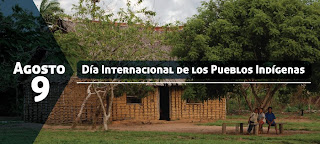The UN (United Nations Organization, of which Ecuador is a member) commemorates this August 9 the International Day of the World's Indigenous Peoples with a strong call to states to comply with existing agreements and commitments with these communities. In fact, the 2013 theme is “Indigenous peoples building alliances: In honor of treaties, agreements, and other constructive arrangements.”
The International Day of the World's Indigenous Peoples was established in 1994 during the International Decade of the World's Indigenous People (1995 – 2004).
These peoples have been excluded from decision-making processes, many have been marginalized, exploited, forcibly assimilated and subjected to repression, torture and murder when they raise their voices in defense of their rights.
For fear of persecution, they often become refugees, sometimes having to hide their identity and abandon their language and traditional customs.
In Ecuador, there are currently several indigenous people accused of terrorism using the same persecution method used by the far-right dictatorships of the 1970s.
There is an urgent need for society in general to become aware of the call to maintain and strengthen cultural identities, emphasizing their right to access development based on their own needs and aspirations as indigenous peoples.
The UN says this year's theme, "Indigenous Peoples Building Partnerships: Honouring Treaties, Agreements and Other Constructive Arrangements," aims to highlight the importance of treaties between States, their citizens, and indigenous peoples, which aim to recognise and defend their rights and their lands, and to establish a framework for coexistence and economic relations.
Navi Pillay, the UN High Commissioner for Human Rights, has urged States to increase their efforts to respect treaties that protect indigenous peoples.
“Even if the treaties were signed or ratified more than a century ago, they remain the cornerstone of protecting the identity, land and customs of these peoples,” Pillay said in a statement marking the International Day of the World’s Indigenous Peoples.
The High Commissioner recalled that these documents often made it possible to put an end to periods of conflict, exploitation and expropriation, and therefore urged governments to honour and respect them.
“However, too often indigenous communities are forced to resort to the courts to force states to honour their promises,” he added.
In Ecuador, the Kichwa people of Sarayaku, for example, are demanding compliance with the ruling of the Inter-American Court of Human Rights, on a case of state abuse that occurred during a previous government. In this regard, this ruling indicates that there must be an apology from the state, despite this the President has stated that he will not go to Sarayaku to offer one because “the leaders of Sarayaku have behaved very badly.” Sectors that support the Sarayaku struggle have described this decision as “pride, prejudice or resentment.”
Meanwhile, indigenous peoples in the country continue to hold their positions demanding that treaties and agreements that the State has made with them be honoured on this day.
![]()

